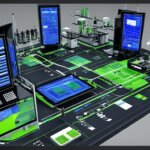Table of Contents
In today’s digital world, computer systems have become an integral part of our lives. From browsing the internet to processing information, computer systems have become the backbone of modern technology. But what exactly is a computer system?
In simple terms, a computer system is a complex arrangement of hardware and software components that work together to perform various functions. These components include the central processing unit (CPU), memory, storage devices, input devices, and output devices, each playing a critical role in the functioning of a computer system.
Computer systems help process information, execute programs, store data, and enable communication, making them an essential part of our daily lives. In this article, we will delve further into the components and functions of a computer system, as well as discuss its significance in the digital world.
Key Takeaways
- A computer system is a complex arrangement of hardware and software components that work together to perform various functions.
- The main components of a computer system include the CPU, memory, storage devices, input devices, and output devices.
- Computer systems help process information, execute programs, store data, and enable communication, making them a vital part of our daily lives.
- Understanding the components and functions of a computer system is essential in comprehending its significance in the digital world.
- In today’s fast-paced digital era, the proper functioning of computer systems enables increased efficiency and productivity in businesses and industries.
Components of a Computer System
A computer system is made up of various components that work together to ensure smooth and efficient functioning. Each component has a specific role to play, and together, they make up the backbone of the system.
The Central Processing Unit (CPU) is the brain of the computer system. Its primary function is to process instructions and data, making it the most crucial component of any computer system. Without a CPU, a computer system cannot function.
Memory, also known as Random Access Memory (RAM), is responsible for temporarily storing data and instructions for the CPU. It enables the quick retrieval of data, making the system faster and more efficient. The more memory a system has, the faster it can process data.
Storage devices, such as hard disk drives (HDD) and solid-state drives (SSD), are responsible for long-term storage of data and applications. They can store vast amounts of data, making them an essential component of any computer system.
Input devices, such as keyboards and mice, enable users to interact with the computer system. They allow users to input data and instructions into the system for processing.
Output devices, such as monitors and printers, enable the system to communicate its results to the user. They display the processed data and information in a user-friendly format, making it easy for users to understand.
All of these components work together to ensure smooth and efficient processing of data, making them crucial for any computer system.
Functions of a Computer System
When it comes to performing various tasks on a computer, it’s essential to understand the functions that it carries out. A computer system can be programmed to perform several critical functions, including processing information, executing programs, storing data, and facilitating communication. Let’s dive deeper into each of these functions:
| Function | Description |
|---|---|
| Processing Information | One of the main functions of a computer is to process information. It takes input in the form of data and performs calculations on it to produce output. |
| Executing Programs | A computer can execute various programs based on user input or pre-programmed instructions. These programs can range from simple text editors to complex video editing software. |
| Data Storage | A computer has the ability to store vast amounts of data, including files, documents, images, videos, and more. It can store this data on multiple devices, including hard drives, solid-state drives, and cloud storage. |
| Facilitating Communication | Computers also play a vital role in facilitating communication. With applications such as email, messaging, and video conferencing, individuals and businesses can easily communicate with others around the world, significantly reducing communication barriers. |
Overall, the functions performed by a computer system are critical to accomplishing various tasks in business, education, and entertainment. Computers help to increase efficiency and productivity in many different domains, making them an indispensable tool in our digital world.
The Significance of Computer Systems in the Digital World
Computer systems are integral to our lives in the digital age. They have transformed the way we live, work, and communicate. The impact of computer systems is far-reaching, and it has affected numerous aspects of our lives, such as business, education, healthcare, entertainment, and more. One of the primary effects of computer systems is the enhanced efficiency and productivity that they bring to businesses and organizations.
With the help of computer systems, businesses can streamline their operations and reduce costs by automating routine tasks and processes. This allows them to focus on other critical areas such as customer service, innovation, and growth. Additionally, computer systems enable employees to work remotely and collaborate with their colleagues globally, further increasing efficiency and productivity.
Moreover, computer systems have been a driving force behind innovation, facilitating advancements in fields such as artificial intelligence, machine learning, and data analytics. These innovations have been instrumental in transforming industries such as finance, healthcare, and transportation, to name a few.
Computer systems have also played a crucial role in enabling communication and connectivity on a global scale. The internet, which is powered by computer systems, has revolutionized the way we communicate and access information. It has brought people from different parts of the world closer and provided a platform for social and economic interactions.
In conclusion, the significance of computer systems in our digital world cannot be overstated. They have impacted various aspects of our lives, increased efficiency and productivity in businesses, driven innovation and transformation, and enabled connectivity and communication on a global scale.
Conclusion
In conclusion, a computer system plays a crucial role in today’s digital world. Its complex arrangement of components works together to process information, execute programs, store data, and facilitate communication. Understanding the components and functions of a computer system is crucial in comprehending its significance and harnessing its potential to enhance and transform various aspects of our lives.
The impact of computer systems on efficiency and productivity in businesses, advancements in technology and innovation, and the transformation of industries cannot be overstated. Additionally, the role of computer systems in enabling connectivity and communication on a global scale has further amplified its significance.
In today’s rapidly evolving technological landscape, it is imperative to stay informed about the latest advancements in computer systems and their potential impact on our lives. By doing so, we can leverage the power of computer systems to drive innovation, efficiency and productivity, and make a positive impact on society as a whole.
FAQ
What is a computer system?
A computer system is a complex arrangement of components that work together to process information, execute programs, store data, and facilitate communication in the digital world.
What are the components of a computer system?
The components of a computer system include the CPU (central processing unit), memory, storage devices, input devices (such as keyboards and mice), and output devices (such as monitors and printers).
What functions does a computer system perform?
A computer system performs various functions, including processing information, executing programs, storing data, and enabling communication.
What is the significance of computer systems in the digital world?
Computer systems have a significant impact on efficiency, productivity, innovation, and connectivity in the digital world. They enhance efficiency and productivity in businesses, drive technological advancements, and enable global connectivity and communication.
Why is it important to understand the components and functions of a computer system?
Understanding the components and functions of a computer system is crucial in comprehending its significance and harnessing its potential to enhance and transform various aspects of our lives, including business operations, education, entertainment, and communication.













